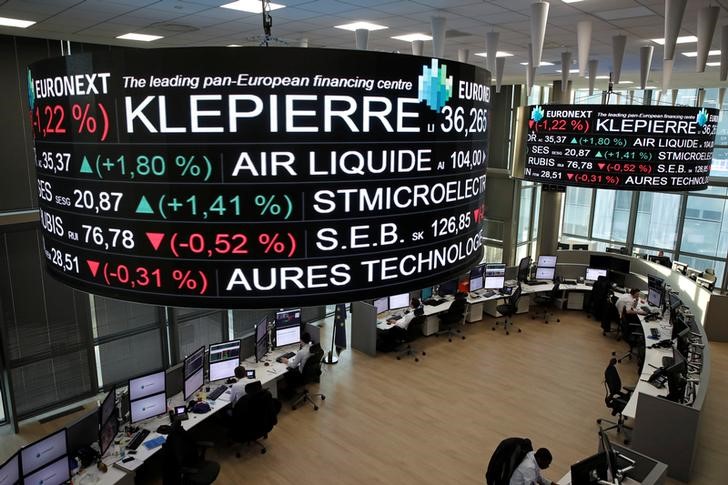By Herbert Lash
NEW YORK (Reuters) - World shares edged lower on Monday after key German and U.S. indexes hit fresh record peaks, while oil prices rose slightly on comments by OPEC's secretary general that indicated further possible cuts in crude production.
The dollar slipped on Monday from a 10-week peak against a basket of currencies as the euro strengthened and stocks on Wall Street faded from their initial highs.
The U.S. dollar rose against the Japanese yen but was lower against the euro and a basket of key currencies after hovering near a 10-week high.
German stocks and the euro were buoyed by data showing Germany's industrial output posted its biggest monthly increase in more than six years in August.
Comments from European Central Bank Executive Board member Sabine Lautenschlaeger calling for the ECB to roll back asset purchases in 2018 also boosted the single currency.
Germany's DAX (GDAXI) index closed at an all-time high while Chinese stocks (CSI300) hit 21-month highs after a week-long break in a delayed reaction to a targeted easing by China's central bank announced on Sept. 30.
Equity markets around the world have been marching higher in a wave of optimism over global growth.
In Europe, Spain's blue-cap IBEX rose to its highest in a week on hopes that Catalonia would take a step back this week from a unilateral declaration of independence from Spain.
Catalonia's secessionist leader faced increased pressure to abandon plans to declare the region independent from Spain, with France and Germany expressing support for the country's unity.
The pan-European FTSEurofirst 300 index (FTEU3) rose 0.20 percent to close at 1,533.82, while the DAX rose 0.16 percent.
MSCI's gauge of stock indexes in 47 markets around the globe (MIWD00000PUS) was slightly lower after coming within a whisker of an intraday high. Stocks on Wall Street fell, though the Dow and Nasdaq earlier set intraday highs.
The Dow Jones Industrial Average (DJI) fell 12.6 points, or 0.06 percent, to 22,761.07. The S&P 500 (SPX) lost 4.6 points, or 0.18 percent, to 2,544.73 and the Nasdaq Composite (IXIC) dropped 10.45 points, or 0.16 percent, to 6,579.73.
The three main Wall Street indexes, along with the MSCI global benchmark, hit closing highs every day last week except for Friday. The upcoming earnings season will justify the lofty valuations for U.S. stocks, analysts said.
"The relatively high valuation, where the market is trading 17 to 18 times earnings, is merited by a very low interest rate environment," said Kim Forrest, senior equity research analyst at Fort Pitt Capital Group in Pittsburgh.
"We are not in danger yet if you keep your eye on rates."
Earnings at S&P 500 companies are expected to have gained 4.9 percent in the third quarter, according to Thomson Reuters data, down from double-digit growth in the first two quarters of this year but still healthy.
Secretary-General Mohammad Barkindo of the Organization of Petroleum Exporting Countries said on Sunday that talks were ongoing to extend a production agreement beyond March 2018 and that more oil-producing nations may join the pact.
Brent rose 17 cents to settle at $55.79 per barrel, while U.S. crude settled at $49.58, up 29 cents on the day.
The dollar index - which measures the greenback against a basket of six other major currencies - on Friday hit 94.267 (DXY), its highest since July 20 following stronger-than-expected average hourly earnings last month.
The dollar index (DXY) fell 0.14 percent, with the euro <EUR=> up 0.14 percent to $1.1749. The Japanese yen strengthened 0.04 percent versus the greenback at 112.60 per dollar.
The U.S. bond market was closed for the Columbus Day holiday.
U.S. gold futures for December delivery settled up 0.8 percent at $1,285.
For a graphic on MSCI world stocks and China blue chips, click http://pdf.reuters.com/pdfnews/pdfnews.asp?i=43059c3bf0e37541&u=
